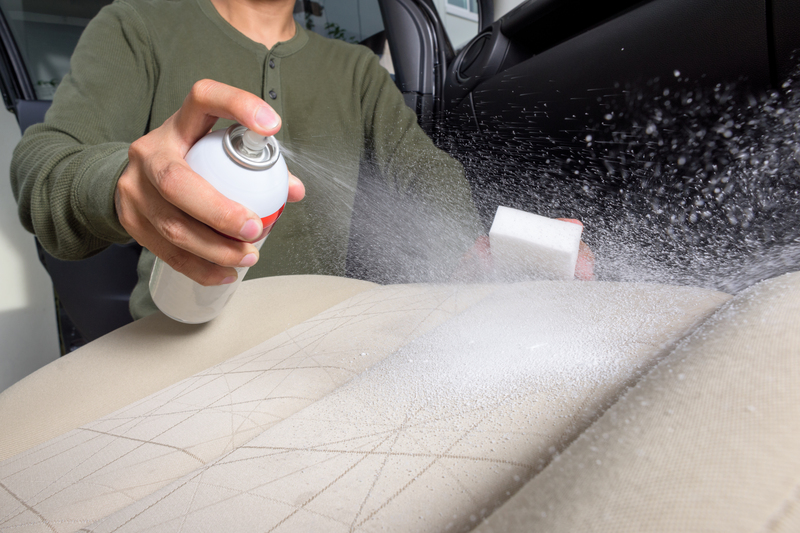Expert Tips for Cleaning Curtains Perfectly
Posted on 19/06/2025
Expert Tips for Cleaning Curtains Perfectly
Curtains are often the unsung heroes of home decor. They provide privacy, filter sunlight, and add a touch of elegance to any room. However, their constant exposure to dust, allergens, and everyday grime makes curtain cleaning an essential, yet often overlooked, household task. Whether you have luxurious drapes or simple panels, knowing the best ways to clean your curtains ensures they remain beautiful, fresh, and functional.
In this comprehensive guide, you'll discover expert tips for cleaning curtains perfectly. From understanding different curtain fabrics to step-by-step cleaning methods and maintenance advice, this article has everything you need for spotless results.
Why Curtain Cleaning Matters
Before diving into how to clean your curtains, it's important to understand why curtain cleaning is essential:
- Improved Air Quality: Curtains trap dust, allergens, and pet hair, which can circulate throughout your home if not cleaned regularly.
- Enhanced Appearance: Freshly-cleaned curtains instantly brighten up any room, making your space look neat and inviting.
- Prolonged Lifespan: Regular cleaning prevents fabric deterioration, color fading, and stubborn stains, helping curtains last longer.
- Odor Removal: Accumulated dirt and dust can cause curtains to emit unpleasant odors, especially in kitchens or homes with smokers.

Understanding Curtain Fabrics
Every expert in curtain cleaning will tell you that knowing your curtain's fabric is the first step towards cleaning them perfectly. Here are the most common types and how their composition influences cleaning:
- Cotton: Durable and commonly machine washable, but may shrink if exposed to high heat.
- Polyester: Resistant to wrinkles and shrinking, making it suitable for machine washing and tumble drying.
- Linen: A stylish, natural option that requires gentle handling, often needing hand washing or dry cleaning.
- Silk: Delicate and sensitive to water--generally requires professional cleaning.
- Velvet: Luxurious and heavy, best suited to steam cleaning or professional care to preserve texture and color.
- Blends: Fabrics combining two or more materials (e.g., cotton-polyester) will have blended care needs--check the care label!
Pro Tip: Always read the manufacturer's care label before washing your curtains. This label contains vital information about recommended washing, drying, and ironing methods.
Preparation: How to Get Ready for Curtain Cleaning
Proper preparation will save you time and prevent damage. Follow these steps before cleaning curtains at home:
- Check Hardware: Remove hooks, rings, and other supports to avoid damaging washers or fabrics.
- Shake Off Dust: Take curtains outside and shake them well to remove loose dust and debris.
- Vacuum Curtains: Use your vacuum cleaner's upholstery or brush attachment to gently remove dust while curtains are still hanging.
- Pre-Treat Stains: Spot clean noticeable stains with a gentle fabric cleaner or a mixture of water and mild detergent.
Best Methods for Curtain Washing
Not all curtains are created equal, and neither are the methods for curtain washing. Below are expert cleaning strategies for various types:
1. Machine Washing Curtains
- Suitable Fabrics: Cotton, polyester, some blends.
- Steps:
- Read Labels: Ensure the fabric is machine washable.
- Gentle Cycle: Use a delicate wash cycle with cold water to prevent shrinkage and preserve color.
- Mild Detergent: Choose a gentle detergent specifically for delicates.
- Wash Alone: Wash curtains separately to avoid lint transfer from other clothes.
- Drying: Tumble dry on low or hang to air dry. Remove while slightly damp to reduce wrinkles.
2. Hand Washing Curtains
- Best For: Linen, delicate lace, and some blends.
- Directions:
- Fill a bathtub or large basin with lukewarm water.
- Add a small amount of mild detergent and swish gently to create suds.
- Immerse the curtains and gently agitate to loosen dirt.
- Rinse thoroughly with clean water, ensuring all detergent residue is removed.
- Drying: Squeeze gently, never wring. Hang or lay flat to air dry.
3. Dry Cleaning Curtains
- Recommended For: Silk, velvet, and heavily embellished curtains.
- Process: Take these specialty fabrics to a professional dry cleaner to avoid water damage, shrinking, or loss of color.
4. Steam Cleaning Curtains
- Ideal For: Heavy curtains, velvet, and delicate fabrics that aren't suited to washing.
- How-To:
- Hang curtains as usual.
- Use a handheld garment steamer, running it down the length of the curtain in slow, even strokes.
- Start from the top and work your way down, being careful to avoid burning the fabric.
- Benefits: Removes wrinkles, lifts light stains, and eliminates odors without full immersion.
Spot Cleaning and Stain Removal
Spot cleaning is crucial for cleaning curtains perfectly, especially when dealing with:
- Food or Drink Stains: Dab immediately with a damp cloth, then gently clean with a mild soapy solution.
- Oil or Grease: Sprinkle cornstarch or talcum powder to absorb oils, let sit for an hour, then brush off and clean.
- Ink Marks: Blot with rubbing alcohol or a specialty stain remover appropriate for the curtain fabric.
Remember: Always test your cleaning method on a hidden corner of the curtain first!
Tips for Drying Curtains Without Damage
- Shake Out Excess Water: After washing, shake curtains to remove excess water and prevent deep wrinkles.
- Line Dry Whenever Possible: Hang curtains outside or on a sturdy indoor rod. Sunlight helps whiten whites naturally (but prolonged sun can cause fading).
- Tumble Dry with Care: Only machine-dry curtains that are labeled as safe for tumble drying, and always use a low heat setting.
- Ironing: If necessary, iron on the lowest recommended setting for the fabric, or use a steamer to release wrinkles.
Professional Curtain Cleaning: When to Call the Experts
Sometimes, perfect curtain cleaning requires a professional touch. Consider hiring a cleaning service if:
- Your curtains are made from expensive, delicate, or antique materials.
- They have stubborn stains or extensive soiling beyond simple home remedies.
- Heavyweight or floor-to-ceiling drapes are too large for standard washers or home handling.
- You want a hassle-free, thorough clean prior to special occasions or seasonal deep cleans.
Professional curtain cleaning services are experienced in fabric care and use specialized equipment to ensure a pristine, damage-free result.
How Often Should You Clean Your Curtains?
A crucial part of curtain maintenance is establishing a realistic curtain cleaning schedule:
- Light Curtains: Wash every 3-6 months for freshness, or more often in high-dust areas.
- Heavy Curtains: Clean at least twice a year (spring and autumn are ideal times).
- Routine Dusting or Vacuuming: Every 2-4 weeks, depending on local dust levels and allergies.
- Spot Cleaning: As soon as spills, stains, or dirt are noticed.
Tip for Allergy Sufferers: Frequent vacuuming and washing can dramatically reduce allergens trapped in curtain fabrics.
Regular Maintenance for Pristine Curtains
Clean curtains stay fresh longer when you put a little effort into weekly upkeep:
- Keep Windows Closed: Limit exposure to outside dust, pollen, and pollution.
- Use Exhaust Fans in Kitchens: Reduce grease and food particles that can settle on nearby curtains.
- Protect from Sun Damage: Rotate curtains periodically or use sheer panels to shield from direct sun.
- Handle Gently: When opening and closing, pull on the fabric, not the seams, to avoid stretching and tears.

Frequently Asked Questions on Curtain Cleaning
Can I wash blackout or thermal curtains?
Blackout or thermal curtains often have special coatings that can be damaged by machine washing. Check the care label. If washable, use only cold water and gentle detergent; consider spot cleaning or professional cleaning for best results.
How do I prevent my curtains from shrinking?
Use cold water and gentle cycles. Avoid high dryer heat, and always check the manufacturer's recommendations.
Is fabric freshener spray a substitute for curtain washing?
No. While air fresheners can mask odors between washes, they do not remove dust, dirt, or allergens. Combine them with regular cleaning for optimal curtain hygiene.
Summary: Your Expert Guide to Perfect Curtain Cleaning
With these expert tips for cleaning curtains perfectly, your drapes can look fresh and crisp all year round. Remember:
- Identify your curtain fabric and always check the care label.
- Choose the right cleaning method: machine wash, hand wash, steam, or dry cleaning as needed.
- Vacuum and spot-treat regularly to minimize buildup.
- Allow curtains to dry properly, and iron or steam if necessary.
- Schedule periodic deep cleans and professional treatments for delicate or difficult fabrics.
Well-maintained curtains don't just look good--they contribute to a cleaner, healthier home environment. With these simple yet effective curtain cleaning strategies, you'll keep your home's style sharp and your air breathable. Try these methods and experience the transformation for yourself!
Related: Expert Tips for Cleaning Upholstery | DIY Home Cleaning Hacks





